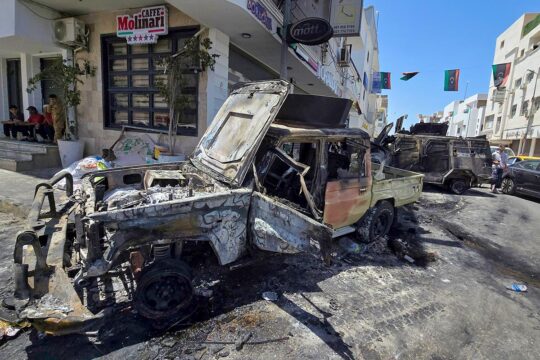El Salvador's civil war may have ended more than two decades ago, but demands for justice over one of its most horrific massacres remain as fresh as the earth being dug up to rebury some of its victims.
"Justice is the only thing that can relieve the pain over our dead," said Dorila Marquez as she oversaw commemorations taking place in village of El Mozote, in northeastern El Salvador.
It was there, between December 10 and 13, 1981 that Salvadoran soldiers killed 1,000 civilians -- men, women and children -- suspected of collaborating with the left-wing FLMN guerrillas they were fighting.
The skeletal remains of the last 21 victims identified last year after being exhumed from mass graves were being reburied through the weekend around El Mozote, this time in individual white coffins with a black stripe.
Argentine forensic anthropologists started the grisly search-and-identify task in 1992. More recovery work took place in November this year, locating the remains of 40 to 45 people.
"It's painful to remember," Marquez said. "But our deaths must give us the strength so that the history of this terrible massacre does not die."
The 60-year-old lost 10 members of her family, including her parents, her sister and her brother-in-law as well as their two children.
Today, she is head of the Human Rights Association of El Mozote, leading efforts to have the 35-year-old crime judged.
- 'We still remember' -
"The path to ending the horrible impunity of 35 years ago has started because seeking justice is a constitutional right that has been denied the families of those massacred," said Ovidio Mauricio, coordinator of a legal group, Tutela Legal, also working toward that goal.
After the end of El Salvador's 1980-1992 war, a UN-backed Truth Commission that preceded an amnesty concluded that 70,000 people had died, and that the US-backed Salvadoran army was responsible for the majority of the atrocities.
The FMLN rebels, also accused of human rights violations, ended up becoming a political party which won a presidential election in 2009. The government apologized for the El Mozote massacre two years later.
But the families are determined to reopen the case around El Mozote.
"We want to say to the world that although 35 years have passed, we still remember our family members," said Vidal Perez, partner to the only survivor of the massacre, Rufina Amaya, who saw her four children killed. Amaya died of a heart attack in March 2007.
- 'Justice will be done' -
The commanders behind the massacre, Colonel Domingo Monterrosa and operations chief Armando Azmitia, are beyond the reach of any court. They died on October 23, 1984 aboard a helicopter sabotaged by the rebels that went down just five kilometers (three miles) from El Mozote.
But a court case against other officers implicated began after the supreme court declared the post-war amnesty unconstitutional last June.
A judge in the northeast of the country agreed in September to start proceedings against the military leaders in charge at the time under the command of General Jose Guillermo Garcia, whom the United States deported to El Salvador in January.
"Sooner or later," Mauricio said, "justice will be done."


